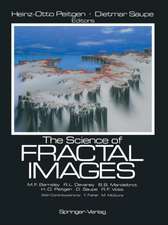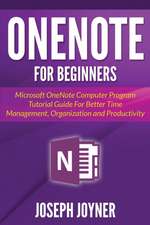Spinning the Web: A Guide to Serving Information on the World Wide Web
Autor Yuval Fisheren Limba Engleză Paperback – 22 feb 1996
Preț: 283.15 lei
Preț vechi: 353.94 lei
-20% Nou
Puncte Express: 425
Preț estimativ în valută:
54.19€ • 58.84$ • 45.52£
54.19€ • 58.84$ • 45.52£
Carte disponibilă
Livrare economică 01-15 aprilie
Preluare comenzi: 021 569.72.76
Specificații
ISBN-13: 9780387945392
ISBN-10: 0387945393
Pagini: 536
Ilustrații: XIV, 536 p. 47 illus.
Dimensiuni: 170 x 244 x 31 mm
Greutate: 1.03 kg
Ediția:Softcover reprint of the original 1st ed. 1996
Editura: Springer
Colecția Springer
Locul publicării:New York, NY, United States
ISBN-10: 0387945393
Pagini: 536
Ilustrații: XIV, 536 p. 47 illus.
Dimensiuni: 170 x 244 x 31 mm
Greutate: 1.03 kg
Ediția:Softcover reprint of the original 1st ed. 1996
Editura: Springer
Colecția Springer
Locul publicării:New York, NY, United States
Public țintă
Popular/generalDescriere
This book is written for: • anyone who wants to serve information on the WWW. The book contains detailed instructions on how to fetch, configure, and administer the most popular WWW server programs. The server chapter is separated into sections that discuss how to set up common configurations and sections that serve as references for all the directives that control server behavior. • anyone who wants to maintain a secure WWW site. The book discusses how to create a secure site. It covers inse cure configurations of servers, browsers, and scripts, and it gives a list of measures that reduce the likelihood of a security breach. • anyone who wants to create information to be served on the WWW. HTML is the language used to create WWW pages, and almost all the variations, extensions, and fla~ vors of HTML are discussed in the book. Two chapters, introductory and advanced, teach HTML by example, and an extensive reference chapter contains all ofHTML 2, all the HTML 3 that is implemented or proposed as of the writ ing of this book, and Netscape Navigator 2 and Spyglass Enhanced Mosaic extensions. It's comprehensive. • anyone who wants to create state-of-the art WWW docu ments. The book discusses how to include images, sounds, and video in documents; how to store and manipulate im ages for optimal effect - for example, rapid transmission vii ~ii ________________________________________________ P_~_rn_c_e over the network; and how to use scripts, both simple and sophisticated.
Cuprins
1 What, How, Where?.- 1.1 The Internet.- 1.2 Connecting to the Internet.- 1.3 Internet Applications.- 1.4 The WWW.- 2 How the Web Works.- 2.1 WWW Browsers.- 2.2 Client/Server Interaction.- 2.3 MIME Types.- 2.4 External Viewers.- 2.5 Executing Local Programs from Hyperlinks.- 2.6 Servers.- 3 HTTP.- 3.1 The HTTP Request.- 3.2 The HTTP Response.- 3.3 Status Codes.- 3.4 HTTP Security.- 4 Servers.- 4.1 Setting up NCSA httpd.- 4.2 Using NCSA httpd Features.- 4.3 Using the NCSA Server.- 4.4 NCSA httpd Security Considerations.- 4.5 Setting up CERN httpd.- 4.6 Using CERN httpd Features.- 4.7 Netscape Servers.- 4.8 Apache.- 4.9 Other Servers.- 5 Security.- 5.1 Server Security.- 5.2 CGI Security.- 5.3 Client Security.- 5.4 Firewalls.- 6 HTML.- 6.1 Quick and Dirty.- 6.2 The Fine Print.- 6.3 Writing HTML.- 6.4 HTML Text Elements.- 6.5 HTML Anchors.- 6.6 Rules and Images.- 6.7 HTML Forms.- 6.8 Common HTML Errors.- 6.9 HTML Style.- 6.10 The Future of HTML.- 6.11 Copyrights.- 7 HTML Reference.- 7.1 Syntax.- 7.2 The HTML Document.- 7.3 The HTML Body.- 7.4 HTML Anchors.- 7.5 Headers.- 7.6 Text Tags.- 7.7 Addresses.- 7.8 Lists.- 7.9 Special Characters.- 7.10 Images and Rules.- 7.11 Embedded Objects.- 7.12 Tables.- 7.13 Frames.- 7.14 HTML Forms.- 7.15 Java and JavaScript.- 7.16 HTML 3.- 8 Advanced HTML Examples.- 8.1 Alignment.- 8.2 Rules.- 8.3 Images.- 8.4 Lists.- 8.5 Anchors.- 8.6 Truly Nasty and Naughty.- 8.7 Frame Documents.- 8.8 Forms.- 9 CGI Scripts.- 9.1 Very Plain CGI Script.- 9.2 The CGI Header.- 9.3 The No-Parse-Header CGI Script.- 9.4 The Script Data.- 9.5 A Bigger Example in C.- 9.6 An Example in Perl.- 9.7 The Environment Variables.- 9.8 Script Security: Shells, Perl, C, or What?.- 9.9 Debugging CGI Scripts.- 9.10 CGI Examples.- 10 Tricks.- 10.1 Images.- 10.2 Serving Sounds.- 10.3 Serving Video.- 10.4 Server-Side Includes.- 10.5 Indexing Your Pages.- 11 WWW Utilities.- 11.1 WWW Indices and Other Information Services.- 11.2 Image Tbols.- 11.3 Helper Applications/External Viewers.- 11.4 HTML Editors.- 11.5 Converters to HTML.- 11.6 Converters from HTML.- 11.7 HTML Checkers.- 11.8 Proxies and Packet Filters.- 11.9 HTTP Log Parsers.- 11.10 CGI Programming.- 12 Java and JavaScript.- 12.1 A Sample Java Program.- 12.2 A Brief Java Overview by Example.- 12.3 JavaScript.- 12.4 JavaScript Examples.- 12.5 JavaScript Operators.- 12.6 The JavaScript Language.- 12.7 JavaScript Statements.- 12.8 JavaScript Objects.- 12.9 More JavaScript Examples.- 13 VRML.- 13.1 VRML Files.- 13.2 Field Values.- 13.3 Nodes.- 13.4 VRML Usage.- Appendixes.- A Uniform Resource Locators.- B Country Code Domain Names.- C Strftime Format Strings.- References.















